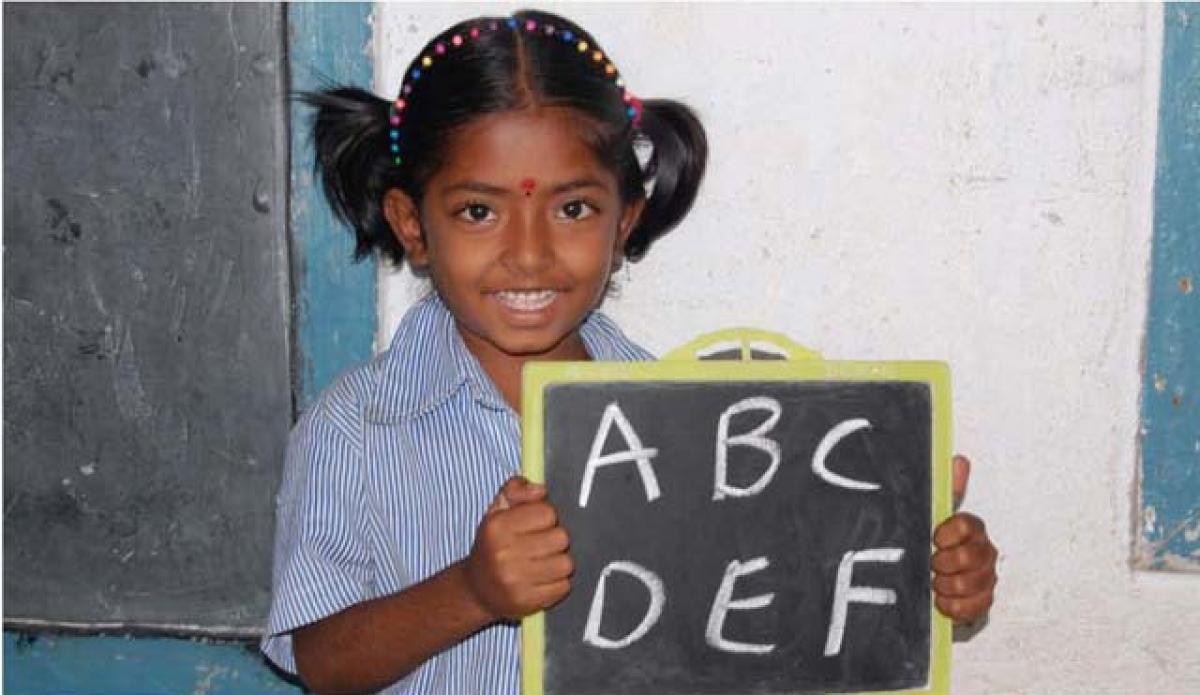Live
- Cops bust smartphone smuggling racket, apprehend 17
- Pedal power: City cycling buffs want govt to promote sustainable mobility
- Nizam College showcases famed alumni
- 21 nominations accepted for Cantt bypoll
- BJP is a ‘pucca local party’: Kishan
- Voters find Candidates persona non-grata in chevella
- Tirupati: Sanskrit is language of divinity says Jagdeep Dhankhar
- Visakhapatnam: INS Sahyadri participated in the maritime partnership exercise
- Scorching heat fails to deter netas from revving up poll drive in Hyd
- Guntur: Dokka Manikya Vara Prasad resigns from YSRCP, joins TDP
Just In

The debate has been unending and multi-dimensional. In a country where annual state of education reports have affirmed the regular rates of dropouts in school education all across the country, theorists have argued endlessly on the pros and cons of educating children in their mother tongue. A closer look at the ground level scenario in our part of the country thus becomes imperative.
Many barriers to inclusive education
The debate has been unending and multi-dimensional. In a country where annual state of education reports have affirmed the regular rates of dropouts in school education all across the country, theorists have argued endlessly on the pros and cons of educating children in their mother tongue. A closer look at the ground level scenario in our part of the country thus becomes imperative.
As per latest statistics available, in the undivided state of Andhra Pradesh, during 2012-13, the elementary level dropout rate (Class I-VIII) was at 26.48 per cent among which SC children were 29.58 per cent and ST children 53.64 per cent.
As per a report compiled by Save the Children, an independent child rights organisation titled ‘Barriers in making the school inclusive: Elementary Schools of Andhra Pradesh’ it has been found that ‘ learning in a language other than one’s mother tongue is one of the barriers to inclusive education’.
Hearteningly, the report quotes the 12th Five Year Plan (2012-17) which reiterates the continuing four priorities for education policy- access, equity, quality and governance. According to the Plan, in recent years the socio-economic inequality in access to education among SCs/STs/Muslims and other social groups has reduced. Remaining concerns include higher dropout rates and numbers of SC/ST/Muslim children out of school, as well as their ‘significantly lower learning outcomes’.
Rather expectedly, given the sharp contours of caste and communities drawn out in our social milieu, the need to assess the linguistic abilities of the school children is not given enough attention with regard to their capacities in optimally using the existing system.
This is also because the school system is not found to be accommodating to their diverse needs and instead pushes them to opt out from school based on their low self-esteem and underachievement. Hence, in this context there is a need to analyse the social, cultural, economic and linguistic abilities which will be useful in promoting inclusive education in the Indian context.
Taking a panoramic view, as the report adds: ‘It is a given that the school environment and classroom interaction can perpetuate the values that promote or challenge inclusion. Children, teachers and community members are all from different social backgrounds which impact not only the learning achievement of children but also the overall teaching practices.
As pointed out, schooling years are very important for children to get peer acceptance and respect from teachers. Similarly, parents are important for children’s social and emotional development and to build their self-confidence and self-esteem’.
Save the Children’s study, which was financially assisted by Sarva Shiksha Abhiyan, Andhra Pradesh was also ensured of the support and cooperation of the teachers in the three regions of the state- Nellore, Srikakulam and Kadapa- where the study was conducted in 20-odd primary and upper primary schools.
By K Naresh Kumar

© 2024 Hyderabad Media House Limited/The Hans India. All rights reserved. Powered by hocalwire.com







